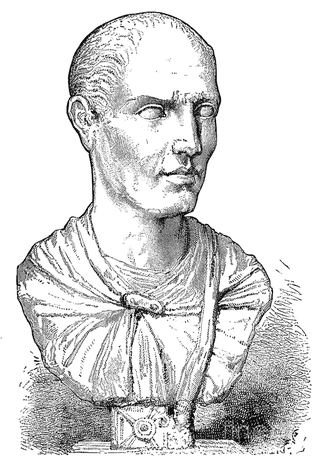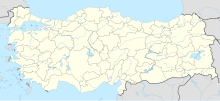
Marcus Antonius, commonly known in English as Mark Antony, was a Roman politician and general who played a critical role in the transformation of the Roman Republic from a constitutional republic into the autocratic Roman Empire.

Gnaeus Pompeius Magnus, known in English as Pompey or Pompey the Great, was a general and statesman of the Roman Republic. He played a significant role in the transformation of Rome from republic to empire. Early in his career, he was a partisan and protégé of the Roman general and dictator Sulla; later, he became the political ally, and finally the enemy, of Julius Caesar.
Lucius Afranius was an ancient Roman plebeian and a client of Pompey the Great. He served Pompey as a legate during his Iberian campaigns, his eastern campaigns and remained in his service right through to the Civil War. He died in Africa right after the Battle of Thapsus in 46 BC.
Aulus Gabinius was a politician and general of the Roman Republic. He had an important career, culminating with a consulship in 58 BC, mainly thanks to the patronage of Pompey. His name is mostly associated with the lex Gabinia, a law he passed as tribune of the plebs in 67 BC that granted Pompey an extraordinary command in the Mediterranean Sea to fight the pirates.
From its origin as a city-state on the peninsula of Italy in the 8th century BC, to its rise as an empire covering much of Southern Europe, Western Europe, Near East and North Africa to its fall in the 5th century AD, the political history of Ancient Rome was closely entwined with its military history. The core of the campaign history of the Roman military is an aggregate of different accounts of the Roman military's land battles, from its initial defense against and subsequent conquest of the city's hilltop neighbors on the Italian peninsula, to the ultimate struggle of the Western Roman Empire for its existence against invading Huns, Vandals and Germanic tribes. These accounts were written by various authors throughout and after the history of the Empire. Following the First Punic War, naval battles were less significant than land battles to the military history of Rome due to its encompassment of lands of the periphery and its unchallenged dominance of the Mediterranean Sea.

Lucius Licinius Lucullus was a Roman general and statesman, closely connected with Lucius Cornelius Sulla. In culmination of over 20 years of almost continuous military and government service, he conquered the eastern kingdoms in the course of the Third Mithridatic War, exhibiting extraordinary generalship in diverse situations, most famously during the Siege of Cyzicus in 73–72 BC, and at the Battle of Tigranocerta in Armenian Arzanene in 69 BC. His command style received unusually favourable attention from ancient military experts, and his campaigns appear to have been studied as examples of skilful generalship.

Sextus Pompeius Magnus Pius, also known in English as Sextus Pompey, was a Roman military leader who, throughout his life, upheld the cause of his father, Pompey the Great, against Julius Caesar and his supporters during the last civil wars of the Roman Republic.

The Battle of Munda, in southern Hispania Ulterior, was the final battle of Caesar's civil war against the leaders of the Optimates. With the military victory at Munda and the deaths of Titus Labienus and Gnaeus Pompeius, Caesar was politically able to return in triumph to Rome, and then govern as the elected Roman dictator. Subsequently, the assassination of Julius Caesar furthered the long Republican decline that led to the Roman Empire, initiated with the reign of the emperor Augustus.

The Third Mithridatic War, the last and longest of the three Mithridatic Wars, was fought between Mithridates VI of Pontus and the Roman Republic. Both sides were joined by a great number of allies, dragging the entire east of the Mediterranean and large parts of Asia into the war. The conflict ended in defeat for Mithridates; it ended the Pontic Kingdom and the Seleucid Empire, and also resulted in the Kingdom of Armenia becoming an allied client state of Rome.
Publius Servilius Vatia Isauricus, was a politician and general of the Roman Republic and a member of the plebeian branch of the gens Servilii. He was elected consul for 79 BC with Appius Claudius Pulcher as his consular collegae. From 78 to 74 BC, as proconsul of Cilicia, he fought against the Cilician Pirates and Isaurian hill tribes in Asia Minor. He was granted the agnomen Isauricus for his victories over the Isaurians. Upon returning to Rome he celebrated a triumph for his victories.

The Sertorian War was a civil war in the Roman Republic fought from 80 to 72 BC between two Roman factions, one led by Quintus Sertorius and another led by the senate as constituted in the aftermath of Sulla's civil war. The war was fought on the Iberian peninsula and was one of the Roman civil wars of the first century BC. The Sertorians comprised many Roman exiles from the Sullan proscriptions led by Sertorius, who fashioned himself proconsul, and native Celts, Aquitanians, and Iberians.

Pontus was a Hellenistic kingdom centered in the historical region of Pontus in modern-day Turkey, and ruled by the Mithridatic dynasty of Persian origin, which may have been directly related to Darius the Great of the Achaemenid dynasty. The kingdom was proclaimed by Mithridates I in 281 BC and lasted until its conquest by the Roman Republic in 63 BC. The Kingdom of Pontus reached its largest extent under Mithridates VI the Great, who conquered Colchis, Cappadocia, Bithynia, the Greek colonies of the Tauric Chersonesos, and for a brief time the Roman province of Asia. After a long struggle with Rome in the Mithridatic Wars, Pontus was defeated.

Cilician pirates dominated the Mediterranean Sea from the 2nd century BC until their suppression by Pompey in 67–66 BC. Because there were notorious pirate strongholds in Cilicia, on the southern coast of Asia Minor, the term "Cilician" was long used to generically refer to any pirates in the Mediterranean.
Sulla's civil war was fought between the Roman general Lucius Cornelius Sulla and his opponents, the Cinna-Marius faction, in the years 83–82 BC. The war ended with a decisive battle just outside Rome itself. After the war the victorious Sulla made himself dictator of the Roman Republic.
Menas, also known as Menodorus, served under Sextus Pompey during the 1st Century BC Roman civil wars.

The military campaigns of Julius Caesar were a series of wars that reshaped the political landscape of the Roman Republic, expanded its territories, and ultimately paved the way for the transition from republic to empire. The wars constituted both the Gallic Wars and Caesar's civil war.

Caucasian campaign of Pompey was a military campaign led by Pompey that took place in 65 BC and was a consequence of the third Mithridatic War fought over Georgian lands and its neighboring frontiers. Rome sought to expand its influence and establish itself as the overlord of the Middle East. After conquering the Kingdom of Pontus and receiving the subjugation of Tigranes II of Armenia the Romans marched on the Kingdom of Iberia, whose king, Artoces had been an ally of Mithridates VI of Pontus, Rome's premier enemy during the 80's, 70's and early 60's BC.
The Battle of Valentia was fought in 75 BC between a rebel army under the command of Marcus Perpenna Vento and a general called Gaius Herennius, both legates of the Roman rebel Quintus Sertorius, and a Roman Republican army under the command of the Roman general Gnaeus Pompeius Magnus. The battle was fought at Valentia in Spain and ended in a stunning victory for the Pompeian army.
The Fimbrian or Valerian legions were two Roman legions which served and fought in all three wars against King Mithridates of Pontus, one of the Roman Republic's chief adversaries during the 80s, 70s and 60s BC. They became a body of long serving legionaries known for their fierce fighting reputation and also, more infamously, for mutiny and abandoning their commander. The legions take their name from the consul Lucius Valerius Flaccus, who first recruited them in 86 BC, and from his subordinate, Gaius Flavius Fimbria, who took command of the legions after inciting a mutiny and murdering Flaccus.

Pompey's campaign against the pirates represented the final phase of the Roman Republic's efforts to combat piracy in the eastern Mediterranean, which had been adversely affecting the eastern Roman provinces. This campaign was completed in approximately 40 days under the command of Pompey in 67 B.C.
The pirates no longer sailed in small groups, but in large hosts, and they had their own commanders, who increased their fame [by their exploits]. They despoiled and plundered first of all those who sailed, not leaving them alone even in winter [...]; then also those who were in the ports. And if one dared to challenge them on the open sea, he was usually defeated and destroyed. If he then managed to beat them, he was unable to capture them, because of the speed of their ships. So the pirates would go right back and loot and burn not only villages and farms, but whole towns, while others made them allies, so much so that they wintered there and set up bases for new operations, as if it were a friendly country.











